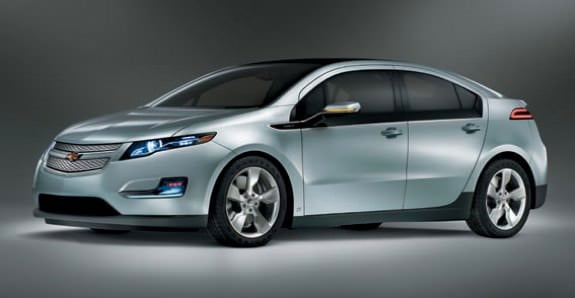Find Our Latest Video Reviews on YouTube!
If you want to stay on top of all of our video reviews of the latest tech, be sure to check out and subscribe to the Gear Live YouTube channel, hosted by Andru Edwards! It’s free!
Tuesday November 29, 2011 11:30 am
GM providing loaner vehicles to Chevy Volt owners while fire risk is evaluated

Executives at General Motors defended the 2012 Chevrolet Volt as safe, even as the National Highway Traffic Safety Association began a formal safety investigation into the vehicle's safety.
As the NHTSA conducts its investigation, Chevrolet will provide any current owner with a loaner vehicle until the agency concludes its investigation, the automaker said. Those who want a loaner can contact their Volt advisor to arrange for a trade-in.
"A vehicle loan program of this nature is well beyond the norm for a preliminary investigation, and it underlines our commitment to the vehicle and its owners," Mark Reuss, president of GM North America, said in a statement. "These steps are the right ones to take regardless of any immediate impact on our operations."
The Chevrolet Volt has been perhaps the most highly publicized effort by an American carmaker to develop a hybrid vehicle. The Volt's appeal, in hands-on tests, is that the car can go a rated 35 miles on electricity alone before shifting to a gas-powered electric generator that can add hundreds of miles to its range. The Volt uses lithium-ion batteries to store a charge. It qualifies as a low-emissions vehicle that will be able to drive in California's HOV lanes, even with just the driver in the car.
In June, a fire started at a Wisconsin facility that stored the Volt, according to reports. But the required NHTSA safety tests have prompted new concerns about the Volt's safety after a collision.
According to a statement from the NHTSA on Friday, the agency deliberately crashed a Chevy Volt in May, to determine how it would withstand a side-impact collision. The battery was damaged and the coolant line ruptured, the agency said. Three weeks later, the vehicle caught fire, and the NHTSA blamed the Volt's lithium-ion battery.
To validate its results, the agency then tested the Volt's Li-ion battery packs on three separate occasions, deliberately damaging the battery compartment. On one, the battery did not generate a fire. But the second test on Nov. 17 produced a "temporary increase in temperature", the agency said. On the third, conducted on Nov. 18, the battery pack was removed and rotated, then emitted sparks and smoke while temperatures climbed to 180 degrees. And last Thursday, the battery tested on Nov. 17 caught fire, prompting the investigation.
"NHTSA is not aware of any roadway crashes that have resulted in battery-related fires in Chevy Volts or other vehicles powered by lithium-ion batteries," the agency said. "However, the agency is concerned that damage to the Volt's batteries as part of three tests that are explicitly designed to replicate real-world crash scenarios have resulted in fire. NHTSA is therefore opening a safety defect investigation of Chevy Volts, which could experience a battery-related fire following a crash. Chevy Volt owners whose vehicles have not been in a serious crash do not have reason for concern."
Mary Barra, head of global product development at GM, also told reporters that the current Volt owners shouldn't worry. "We don't think that there is an immediate fire risk," Barra said, as reported by TheLedger.com. "This is a post-crash activity."
This article, written by Mark Hachman, originally appeared on PCMag.com and is republished on Gear Live with the permission of Ziff Davis, Inc.
Latest Gear Live Videos
Advertisement
Advertisement
Advertisement
© Gear Live Inc. {year} – User-posted content, unless source is quoted, is licensed under a Creative Commons Public Domain License. Gear Live graphics, logos, designs, page headers, button icons, videos, articles, blogs, forums, scripts and other service names are the trademarks of Gear Live Inc.











